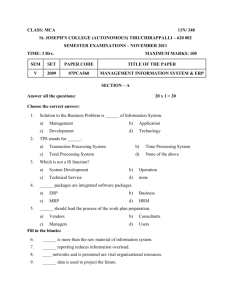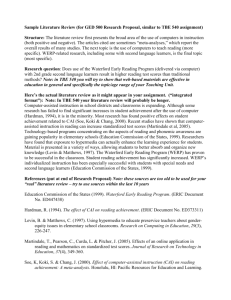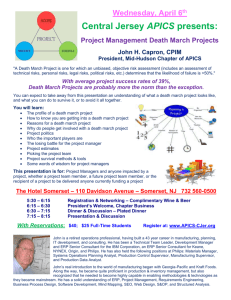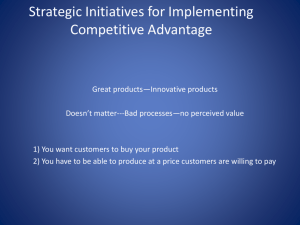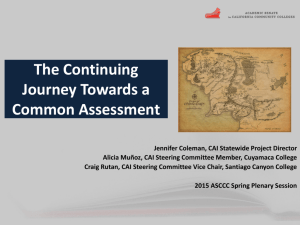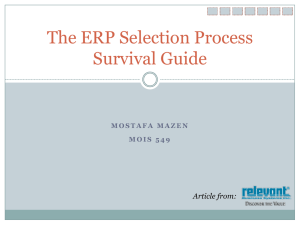CAI Delivery Leader
advertisement
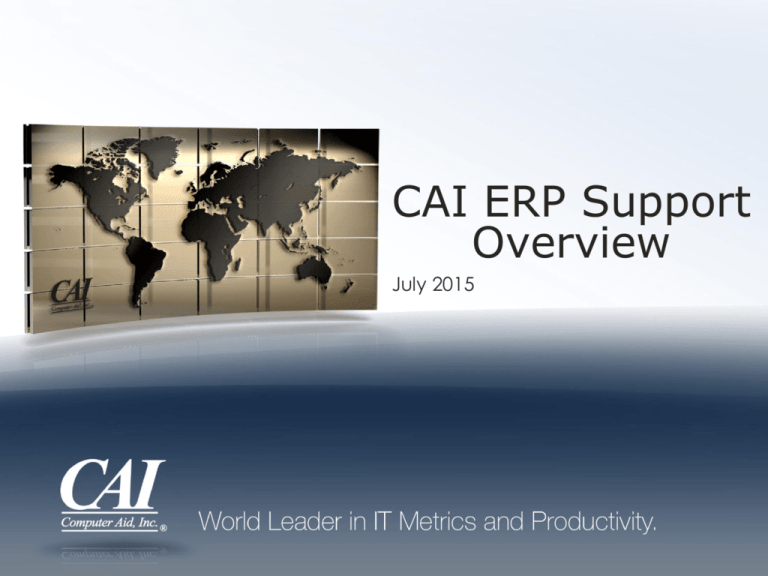
CAI ERP Support Overview July 2015 Introduction to CAI Core Competencies Corporate Profile • Privately held, Pennsylvania-based firm founded in Allentown in 1981 • Annual revenues of nearly $550 Million • Specializing in IT services for Fortune 1000 companies and large public sector enterprises • Employs nearly 4,000 associates working in over 30 offices and four delivery centers in the U.S. and abroad ERP Practice Technology, Mobility, & Security Services • • • • • • • IT Strategy Application Design & Development Solutions Architecture Application Maintenance / Support IT Management / Governance Requirements Engineering Big Data and Analytics Business Management Consulting • • • • PMO and IV&V Business Process Management Organizational Change Business Continuity Planning Strategic Resourcing • Managed Staffing Provider • Knowledge Capture • Staff Augmentation Local firm feel with global firm results! • SAP Services Partner since 2006 / Oracle Services Partner since 2012 • Focused on SAP, Oracle ERP, JD Edwards, and PeopleSoft • Certified ERP Vendor Network for ‘on-demand’ capacity • CAI’s Application Maintenance / Support tools and processes imbedded into ERP package toolsets • On-Shore and Right-Shore models 2 Issues Facing IT Leadership Today’s ERP systems are MISSION CRITICAL…. but require extensive support to sustain! Your business is looking for IT to provide expanded business capabilities using current and emerging technologies • Major ERP Project work or system extensions • Digitalization, Mobile, Social, Big Data Analytics Your business is asking IT to be more responsive, take risks, be innovative, fail fast! You Need To • T ransform your organization’s skills! • I nvest in new tools / technologies! • M anage within budget constraints! • E nsure the ERP system continues to provide mission critical support to the business! CAI can provide the TIME you need to achieve these goals! 3 CAI’s ERP Application Support Model CAI has developed proprietary Application Maintenance / Support tools and processes that consistently provide a 30% cost savings to our Clients while improving service levels! Clients can use these savings to: • Focus on higher priority strategic initiatives • Invest in new tools / emerging technologies • Fund other business imperatives 4 CAI ERP Legacy Application Support Legacy Application Support (LAS) Practice • Began LAS Services (DuPont) in 1983 • Over 100 LAS Engagements with Fortune 1000 Clients • Platform Independent: .Net, Java, Oracle EBS, SAP, BPCS, JD Edwards, PeopleSoft, Other Development Tools • ERP methodologies / tools integrated with CAI proprietary LAS processes / tools ERP Systems have been operational for over 10 years! CAI allows you to reallocate assets to strategic initiatives! 5 CAI ERP Legacy Application Support Exceptional Support for your Mission Critical ERP Applications • Improve Your Support Model – Streamline Operations via Continuous Improvement • Visibility / Dashboards via Tracer – Improve Internal Customer Satisfaction • Proactive Surveys and Follow-up (APO / AMI) – Reduce Costs • Right Shore Resources / AKT Documentation • Increase Your Focus on Development / New Technology – Reallocate Support Capacity to Critical Business Needs – Utilize CAI’s Re-badging or Right To Hire options • Client First Approach – Tier II Provider – We provide experts; not overhead – $550M Privately held company; long-term client focus; not a short term analyst focus 6 Typical Engagement Milestones Assessment A 1 – 4 week activity to understand the existing ERP support model and the business objectives. Transition Proposal Using our proprietary tools and processes, we’ll transition support from your IT organization to CAI. This includes formal Application Knowledge Transfer (AKT). Based on the Assessment, CAI will create a detailed plan that achieves the objectives of the business. 7 Steady State At this point CAI will be responsible for the support scope defined in the Proposal. We’ll have baselines and metrics and a well defined governance structure in place. Representative ERP Clients Manufacturing Consumer Products Pharmaceuticals / Healthcare Chemical / Energy Public Sector Financial Services National Merit Scholarship Corporation 8 Technology CAI’s ERP Solutions Practice Typical / Initial Support Engagement Scope • • • • • • • • • Service Desk (Level 2/3 Support) Incidents (Break / Fix) Enhancements under ‘x’ hours Data Loads – Master / Transactional Mass Changes of Data Technical & Interface Support Unit / Systems Testing Performance Metrics On-Call Support / Implementation Check-Out Supplemental ERP Services • • • • • • Strategic Consulting / Planning Enhancements over ‘x’ hours, Projects, Upgrades Service Desk (Dedicated Level 1 Service Desk) Quality Assurance & Testing Infrastructure Design, Implementation, and Management Staff Augmentation (Hard to find skills for long or short term assignments) 9 Typical Support Organizational Model Sr. CAI Leader Client CIO CAI Practice Leader Client ERP Leader Client IT Leader(s) CAI Delivery Leader •CAI Functional Teams – Sales, Finance, Purchasing, HR, etc. - All teams have a hands-on Team leader - All teams do Analysis and Development •CAI Analytics – Data Warehouse Solutions •CAI Technical Support – Interfaces, Workflow, Archiving •CAI QA / Testing •CAI Legacy System Support •CAI Service Desk – Level 2/3 Call Support / Ticketing * If ERP modules are used for these functions they can be absorbed into the CAI Support team. •Strategy / Business Optimization •Program Office / Portfolio Management •Enterprise Architecture •New ERP Features / Major Development •Non-ERP systems – Marketing, Engineering, etc.* •Service Desk – Level 1 Call Support / Ticketing •Security / Risk Management •Network / Voice / Data Center ** ** If these functions want to be outsourced, CAI can leverage partners for this service. 10 Next Steps • Schedule “Feasibility Discussion” • • • • • • Overview of CAI Transition Process Discussion of KPI’s for Engagement Performance Guarantee Discussion Scope Potential/Selection Assessment Process/Responsibilities Identify Value Statement to Client • 10am – 3pm (Working Lunch) 11
